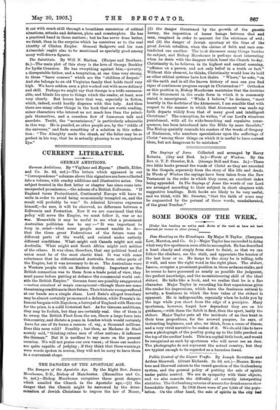THE DANGERS OF THE APOSTOLIC AGE.
The Dangers of the Apostolic Age. By the Right Rev. James Moorhouse, D.D., Bishop of Manchester. (Macmillan and Co. 3s. net.)—Bishop Moorhouse recognises three great dangers which assailed the Church in the Apostolic age,—(1) the danger that the. Church might be narrowed by the deter- mination of Jewish Christians to impose the law of Moses; (2) the danger threatened by the growth of the gnostic, heresy, the imposition of lesser beings between God and man, imagined in order to account for the existence of evil; and (8) the danger of Jewish apostasy at the time of the great Jewish rebellion, when the claims of faith and race con- tradicted one another. The book discusses many things besides its subject, and Bishop Moorhens is perhaps most interesting when he deals with the dangers which beset the Church to-day. Christianity is, he believes, in its highest and central meaning, "affiance on a person, and not only belief in a truth or fact." Without this element, he thinks, Christianity would lose its hold as other ethical systems have lost theirs. " Where," he asks, "on all the earth and in all the known history of man can you find signs of continuous progress except in Christendom ?" Orthodox as this position is, Bishop Moorhens maintains that the doctrine of the Atonement in the crude form in which it is commonly stated is unscripturaL " While I believe," he declares, "most heartily in the doctrine of the Atonement, I am sensible that with respect to the manner in which that Atonement was made my faith departs widely from that of many good and intelligent Christians." The conception, he writes, " of our Lord's vicarious punishment, with all its wide-branching and repulsive conse- quences, has been introduced' into the Bible by mere theorists." The Bishop quaintly reminds his readers of the words of Gregory of Nazianzen, who numbers speculations upon the sufferings of Christ "among those things on which it is useful to have correct ideas, but not dangerous to be mistaken."






































 Previous page
Previous page